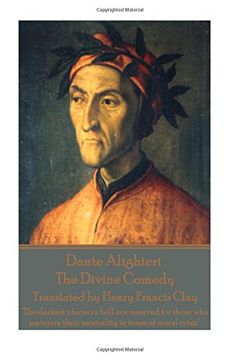Dante Alighieri - The Divine Comedy, Translated by Henry Francis Clay: "The darkest places in hell are reserved for those who maintain their neutrality in times of moral crisis" (en Inglés)
Reseña del libro "Dante Alighieri - The Divine Comedy, Translated by Henry Francis Clay: "The darkest places in hell are reserved for those who maintain their neutrality in times of moral crisis" (en Inglés)"
Durante degli Alighieri, but better known simply as Dante, was born in Florence in about 1265. He grew to be the major Italian poet of the Late Middle Ages and wrote perhaps the greatest of literary works in Italian: The Divine Comedy. In Italy, Dante is often referred to as il Sommo Poeta - "the Supreme Poet". Significantly he writes in the vernacular, an amalgam of Tuscan dialect, Latin and other influence and for this he is often cited as the Father of the Italian Language. As well he wrote The Divine Comedy in a three-line rhyme scheme, or the terza rima, a significant development and its first use, of course, is attributed to him. This major work provided influence for almost all who followed including Milton and Tennyson and has been translated into English by many world class poets including Henry Wadsworth Longfellow and Laurence Binyon. Henry Francis Cary was born in Gibraltar, on December 6th, 1772. He was the eldest son of William Cary, at the time a Captain of the First Regiment of Foot and Henrietta Brocas. Cary was educated at Rugby School and at the grammar schools of Sutton Coldfield and Birmingham, before proceeding, in 1790, to Christ Church, Oxford, where he studied French and Italian literature. He was a regular contributor at school to the Gentleman's Magazine, and published a volume of Sonnets and Odes. In 1797 he took holy orders and became the vicar of Abbots Bromley in Staffordshire. In 1808 he moved to London and became reader at the Berkeley Chapel and subsequently lecturer at Chiswick and the curate of the Savoy Chapel. Cary's translation of the complete Divina Commedia by Dante in blank verse appeared in 1814. It had to be published by Cary himself as publishers believed the risk of failure too great after the losses on his earlier rendering on The Inferno. The translation was brought to the notice of Samuel Rogers by Thomas Moore. Rogers made some additions to an article on it by Ugo Foscolo in the critically important Edinburgh Review. This article, as well as some fulsome praise from Coleridge in a lecture at the Royal Institution, led to a general consensus of its merit. Gradually Cary's Dante took its place among standard works, passing through four editions in the translator's lifetime. Between 1821 and 1824 Cary published a series of papers in The London Magazine which were later collected together in book form as Lives of The English Poets. He also published a companion volume, Lives of theFrench Poets. In 1824 Cary published a translation of The Birds of Aristophanes, the celebrated Greek dramatist. By 1826 he was appointed assistant librarian in the British Museum, a post which he held for eleven years. Cary had been married to Jane Ormsby for a number of years and the couple had nine children; William Lucius, Jane Sophia, Henrietta, James Walter, Henry, Charles Thomas, Francis Stephen, John and Richard. In 1833 Cary fell ill and was granted a six month leave of absence to recuperate. He took the remaining time to travel with his son, Francis, to Amiens, Paris, Lyons, Aix, Nice, Mentone, Genoa, Pisa, Florence, Sienna, Rome (staying a month), Naples, Bologna, Verona, Venice (again staying a month), Innsbruck, Munich, Nuremberg, Frankfurt, Cologne, Rotterdam, The Hague, Amsterdam, Brussels, Ghent and Bruges. In 1841 a crown pension of 200 a year, obtained through the efforts of Samuel Rogers, was conferred on him. Cary's Lives of the early French Poets, and Lives of English Poets (from Samuel Johnson to Henry Kirke White), intended as a continuation of Johnson's Lives of the Poets, were published in collected form in 1846. He was buried in Poets' Corner, Westminster Abbey.
Dante Alighieri fue un poeta italiano. Su obra maestra, Divina Comedia, es una de las obras fundamentales de la transición del pensamiento medieval al renacentista. Es considerada la obra maestra de la literatura italiana y una de las cumbres de la literatura universal. En italiano es conocido como "el Poeta Supremo". A Dante también se le llama el "Padre del idioma" italiano. Participó activamente en las luchas políticas de su tiempo, por lo cual fue desterrado de su ciudad natal. Fue un activo defensor de la unidad italiana. Escribió varios tratados en latín sobre literatura, política y filosofía.
Ver más
Ver menos

